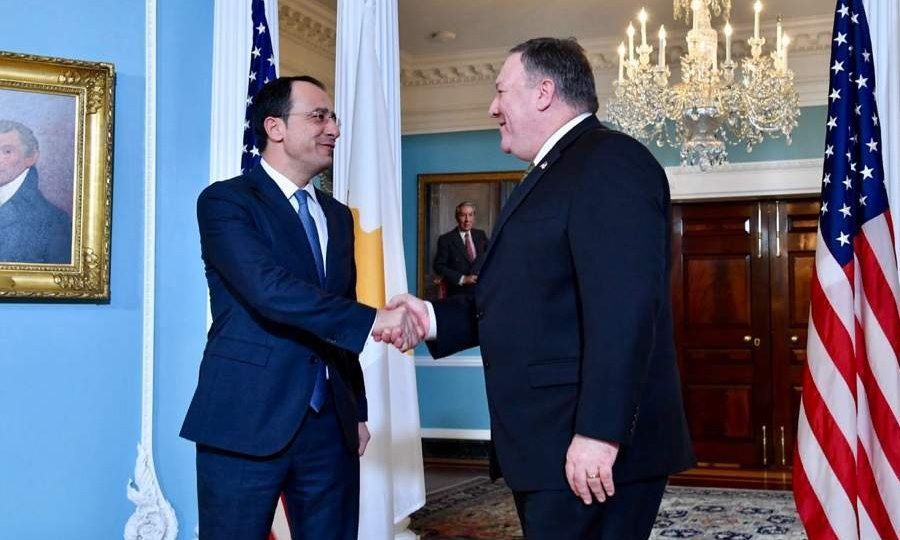If you look very closely, underneath the sheen of a modern European Cyprus there is the remnant of a Cold War legacy that could quickly come back into focus as the world polarizes.
Historians or amateur conspiracy theorists will argue that Cyprus is a victim of the Cold War, collusion by the West for partitioning the island to stop it becoming Cuba of the Mediterranean.
At the time, Washington viewed Cyprus’ first president (Archbishop Makarios) as a Castro-like figure who flirted too closely with Moscow at the height of the stand-off between the Soviet Union and everyone this side of the Iron Curtain.
Cyprus was, arguably, also a victim of circumstance in 1974 when Turkey invaded.
Guarantor powers Britain and Greece were in a mess, Athens was ruled by a military junta while the Labour minority government was weak and dealing with industrial strife.
Greece and Britain – although duty-bound – were not going to intervene or shed blood for Cyprus.
Across the pond, the Americans were suffering ignominy in Vietnam while they had a crook for a president who wasn’t bothered about saving a small dot in the East Med, especially one with a ‘commie sympathiser’.
Nixon was undone by Watergate, resigning in August 1974, just before the Turkish army launched its second offensive in Cyprus.
If ever a series of external events conspired to seal the fate of a country, what happened to Cyprus in 1974 is a prime example.
Pardon my hash browns of a history lesson, but the Cyprus conflict has been preserved like a museum piece.
The lines of division are still visible even if the politics of Cold War brinkmanship are long forgotten.
We may have thought so, but there are signs of another East-meets-West Rocky IV tussle coming to our backyard in the not too distant future.
There was a whiff of panic in the air when the new defence minister was at pains to underline that Cyprus would not cut ties with its friend Russia just because Washington added Nicosia to its military training programme.
After the US placed an arms embargo on Cyprus in the 1980s, Nicosia turned to Russia to supply it with military hardware to defend itself.
When it decided to purchase Russian S-300 missiles that could hit the Turkish mainland, the Americans put the squeeze on to ‘divert’ the rockets to Greece for a holiday.
Back in the last century – Cyprus-US relations were frostier than a weather station in Antarctica, but the thaw has been rapid.
Cyprus woke up to the fact it could play a positive role in the region by making allies that would highlight its importance as a friend to America.
It took a few years for the penny to drop while the prospect of tapping natural gas resources fuelled its regional partnership with Greece, Egypt, and Israel.
The kind of players that get invited to the White House for drinks and leave with ‘financial gifts’.
Gatecrashers
No longer the failed gatecrasher, Cyprus was invited to the party, basking in the glow of American influence and special favours only given to trusted friends.
It was no coincidence this week the United States announced it will provide International Military Education and Training (IMET) to Cyprus from next year, for the first time.
“IMET serves as an effective means to strengthen military partnerships and international coalitions that defend our national security interests,” said the US.
Offering IMET to Cyprus falls under America’s Eastern Mediterranean Security and Energy Partnership Act of 2019, to strengthen a security partnership in the region with Nicosia, Athens and Israel.
This act also lifted a 32-year-old US arms embargo on Cyprus, paving the way for the upgrading of relations.
Washington now considers the Republic of Cyprus “an important partner in the Eastern Mediterranean region”.
Still, with this special relationship comes the responsibility of following the rules of membership while not letting the side down.
Like any family, there needs to be trust and loyalty to the members of that group, there can be no back peddling or hesitation.
There is an expectation for Cyprus to behave in America’s best interest, basic code for not getting too cosy with Moscow, ditto for Beijing.
Cyprus may have secured the recognition it craved from the Trump administration, but it must now walk a fine line where a new Cold War is brewing.
Nicosia came out strongly to confirm it is business as usual with Russia and China who are seen as crucial allies in the UN Security Council.
But trying to be everyone’s friend in a global fight for supremacy is a risk-laden end game.










